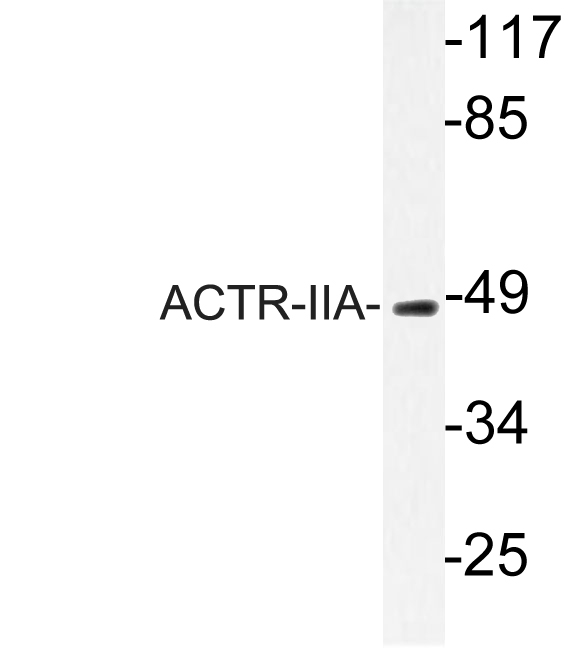ACTR-IIA Polyclonal Antibody
- Catalog No.:YT0108
- Applications:WB;ELISA
- Reactivity:Human;Mouse;Rat
- Target:
- ACTR-IIA
- Fields:
- >>Cytokine-cytokine receptor interaction;>>TGF-beta signaling pathway;>>Signaling pathways regulating pluripotency of stem cells;>>Fluid shear stress and atherosclerosis
- Gene Name:
- ACVR2A
- Protein Name:
- Activin receptor type-2A
- Human Gene Id:
- 92
- Human Swiss Prot No:
- P27037
- Mouse Gene Id:
- 11480
- Mouse Swiss Prot No:
- P27038
- Rat Gene Id:
- 29263
- Rat Swiss Prot No:
- P38444
- Immunogen:
- The antiserum was produced against synthesized peptide derived from human ACTR-IIA. AA range:10-59
- Specificity:
- ACTR-IIA Polyclonal Antibody detects endogenous levels of ACTR-IIA protein.
- Formulation:
- Liquid in PBS containing 50% glycerol, 0.5% BSA and 0.02% sodium azide.
- Source:
- Polyclonal, Rabbit,IgG
- Dilution:
- WB 1:500 - 1:2000. ELISA: 1:40000. Not yet tested in other applications.
- Purification:
- The antibody was affinity-purified from rabbit antiserum by affinity-chromatography using epitope-specific immunogen.
- Concentration:
- 1 mg/ml
- Storage Stability:
- -15°C to -25°C/1 year(Do not lower than -25°C)
- Other Name:
- ACVR2A;ACVR2;Activin receptor type-2A;Activin receptor type IIA;ACTR-IIA;ACTRIIA
- Observed Band(KD):
- 48kD
- Background:
- This gene encodes a receptor that mediates the functions of activins, which are members of the transforming growth factor-beta (TGF-beta) superfamily involved in diverse biological processes. The encoded protein is a transmembrane serine-threonine kinase receptor which mediates signaling by forming heterodimeric complexes with various combinations of type I and type II receptors and ligands in a cell-specific manner. The encoded type II receptor is primarily involved in ligand-binding and includes an extracellular ligand-binding domain, a transmembrane domain and a cytoplasmic serine-threonine kinase domain. This gene may be associated with susceptibility to preeclampsia, a pregnancy-related disease which can result in maternal and fetal morbidity and mortality. Alternative splicing results in multiple transcript variants of this gene. [provided by RefSeq, Jun 2013],
- Function:
- catalytic activity:ATP + [receptor-protein] = ADP + [receptor-protein] phosphate.,cofactor:Magnesium or manganese.,function:On ligand binding, forms a receptor complex consisting of two type II and two type I transmembrane serine/threonine kinases. Type II receptors phosphorylate and activate type I receptors which autophosphorylate, then bind and activate SMAD transcriptional regulators. Receptor for activin A, activin B and inhibin A.,similarity:Belongs to the protein kinase superfamily. TKL Ser/Thr protein kinase family. TGFB receptor subfamily.,similarity:Contains 1 protein kinase domain.,subunit:Interacts with AIP1. Part of a complex consisting of AIP1, ACVR2A, ACVR1B and SMAD3.,
- Subcellular Location:
- Membrane; Single-pass type I membrane protein.
- Expression:
- Mammary gland,Testis,
- June 19-2018
- WESTERN IMMUNOBLOTTING PROTOCOL
- June 19-2018
- IMMUNOHISTOCHEMISTRY-PARAFFIN PROTOCOL
- June 19-2018
- IMMUNOFLUORESCENCE PROTOCOL
- September 08-2020
- FLOW-CYTOMEYRT-PROTOCOL
- May 20-2022
- Cell-Based ELISA│解您多样本WB检测之困扰
- July 13-2018
- CELL-BASED-ELISA-PROTOCOL-FOR-ACETYL-PROTEIN
- July 13-2018
- CELL-BASED-ELISA-PROTOCOL-FOR-PHOSPHO-PROTEIN
- July 13-2018
- Antibody-FAQs
- Products Images

- Western blot analysis of lysates from rat kidney, using ACTR-IIA antibody.



